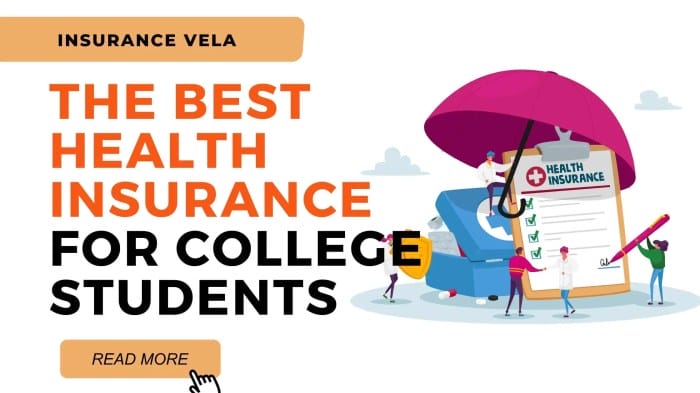College life is a whirlwind of academics, extracurriculars, and personal growth. Amidst this exhilarating journey, it’s crucial to prioritize health and well-being. Health insurance plays a pivotal role in ensuring access to quality healthcare, protecting you from unexpected medical expenses, and providing peace of mind.
This comprehensive guide will equip you with essential knowledge about health insurance, empowering you to make informed decisions and navigate the healthcare system confidently. From understanding the basics to utilizing preventive care services, we’ll cover everything you need to know about health insurance as a college student.
Understanding Health Insurance for College Students

Health insurance is a crucial aspect of well-being for college students, providing coverage for medical expenses and ensuring access to quality healthcare. Understanding health insurance plans and making informed decisions can help students safeguard their health and financial stability.
Common health insurance plans available to college students include:
Student Health Insurance Plans
These plans are typically offered by colleges and universities and provide comprehensive coverage for various medical expenses. They may include services such as doctor visits, hospitalization, prescription drugs, and preventive care.
Private Health Insurance Plans
Students can purchase private health insurance plans from insurance companies. These plans offer a range of coverage options and flexibility in choosing deductibles and co-payments. However, they may have higher premiums compared to student health insurance plans.
Family Health Insurance Plans
Some students may be eligible for coverage under their parents’ or guardians’ health insurance plans. This can be a cost-effective option, but it’s essential to verify coverage details and ensure that the plan meets the student’s needs.
Benefits of Having Health Insurance
Health insurance provides essential coverage for college students, offering a wide range of advantages to safeguard their health and well-being. It protects them from unforeseen medical expenses, ensures access to quality healthcare services, and promotes preventive care measures.
Medical Expenses Coverage
Health insurance covers various medical expenses incurred by college students, including:
- Doctor visits: Consultations with healthcare professionals for routine checkups, illnesses, and injuries.
- Hospitalization: Coverage for inpatient care, including room and board, surgeries, and other medical procedures.
- Prescription drugs: Reimbursement for the cost of prescription medications prescribed by healthcare providers.
- Emergency services: Coverage for urgent medical care, including ambulance transportation and emergency room visits.
Preventive Care Coverage
Health insurance also includes preventive care services that help maintain good health and detect potential health issues early on. These services may include:
- Regular checkups: Routine physical examinations and screenings to monitor overall health and identify potential problems.
- Immunizations: Coverage for vaccinations to protect against preventable diseases.
- Wellness programs: Access to health and wellness programs that promote healthy lifestyles and habits.
- Mental health services: Coverage for mental health screenings, therapy, and counseling.
Emergency Situations Coverage
Health insurance provides peace of mind by covering unexpected medical emergencies. In the event of an accident or sudden illness, health insurance can help cover the costs of:
- Emergency room visits: Coverage for immediate medical care in emergency departments.
- Urgent care centers: Reimbursement for medical treatment received at urgent care facilities.
- Ambulance transportation: Coverage for transportation to the nearest medical facility in an emergency.
- Out-of-network care: Coverage for medical expenses incurred while traveling or receiving care from non-network providers.
Types of Health Insurance Plans

Choosing the right health insurance plan is essential for college students to ensure access to quality healthcare at an affordable cost. Different types of health insurance plans offer varying coverage options, premiums, and deductibles.
Plan Types
There are several types of health insurance plans available to college students. Each plan type has its own unique benefits and drawbacks, so it’s important to compare them carefully before making a decision.
| Plan Type | Coverage Details | Premiums | Deductibles |
|---|---|---|---|
| Health Maintenance Organization (HMO) |
|
Low to moderate | Typically low |
| Preferred Provider Organization (PPO) |
|
Moderate to high | Typically higher than HMOs |
| Point-of-Service (POS) Plan |
|
Moderate to high | Typically higher than HMOs |
| High-Deductible Health Plan (HDHP) |
|
Low | Typically high |
Choosing the Right Health Insurance Plan

When selecting a health insurance plan, college students should consider several factors to ensure they have the coverage they need at a price they can afford.
Coverage Needs
- Evaluate your current and potential future healthcare needs, including routine checkups, prescriptions, and specialist visits.
- Consider any pre-existing conditions you have and ensure the plan covers treatment for those conditions.
- Research the availability of in-network providers in your area to ensure you can access care conveniently.
Budget
- Compare the monthly premiums, deductibles, and copayments of different plans to find one that fits your budget.
- Consider the potential costs of out-of-pocket expenses, such as coinsurance and copays, and ensure you can afford these costs if needed.
Available Networks
- Choose a plan with a network of providers that includes doctors, specialists, and hospitals in your area.
- Consider whether you want a plan that allows you to see out-of-network providers, and if so, what the costs and restrictions are.
Navigating Health Insurance Terminology
Navigating health insurance can be daunting for college students. Understanding common terms like premium, deductible, copay, and coinsurance is essential for making informed decisions about your health coverage. Let’s demystify these terms and provide a glossary of essential health insurance vocabulary.
Premium
The premium is the monthly or annual fee you pay to your health insurance provider to maintain your coverage. The premium amount varies depending on factors like your age, health status, and the type of plan you choose.
Deductible
The deductible is the amount you have to pay out of pocket before your health insurance coverage kicks in. Once you meet your deductible, your insurance company starts paying for your covered medical expenses. Higher deductibles typically result in lower premiums, and vice versa.
Copay
A copay is a fixed amount you pay for certain medical services, such as a doctor’s visit or prescription drug. Copays are typically lower than the total cost of the service, and they help keep your out-of-pocket expenses manageable.
Coinsurance
Coinsurance is a percentage of the total cost of a medical service that you are responsible for paying after you meet your deductible. For example, if your coinsurance rate is 20%, you would pay 20% of the cost of a medical service, and your insurance company would pay the remaining 80%.
Glossary of Essential Health Insurance Terms
- Actuarial Value: A measure of the comprehensiveness of a health insurance plan, expressed as a percentage. A higher actuarial value means the plan covers more medical expenses.
- Annual Maximum Out-of-Pocket Limit: The maximum amount you have to pay for covered medical expenses in a year before your insurance company starts paying 100% of the costs.
- Dependent: A person who is covered under your health insurance plan, such as a spouse, child, or other family member.
- Essential Health Benefits: A set of ten essential health benefits that all health insurance plans must cover, including doctor’s visits, emergency services, and prescription drugs.
- Formulary: A list of prescription drugs covered by your health insurance plan.
- In-Network Provider: A healthcare provider who has a contract with your health insurance company and agrees to provide services at a discounted rate.
- Out-of-Network Provider: A healthcare provider who does not have a contract with your health insurance company and may charge you more for services.
- Provider Network: The group of healthcare providers who have contracts with your health insurance company.
Utilizing Health Insurance Services

Health insurance plays a vital role in accessing quality healthcare. As a college student, understanding how to use your health insurance is essential to ensure you receive the necessary medical care. This includes knowing how to find in-network providers, schedule appointments, and submit claims for reimbursement.
Finding In-Network Providers
In-network providers are healthcare professionals or facilities that have a contract with your health insurance company. Using in-network providers can save you money on your healthcare costs, as your insurance company will typically cover a larger portion of the expenses.
To find in-network providers, you can:
- Check your insurance company’s website or app.
- Call your insurance company’s customer service number.
- Ask your doctor or other healthcare providers for recommendations.
Scheduling Appointments
Once you have found an in-network provider, you can schedule an appointment by calling their office directly or using their online scheduling system (if available). Be sure to have your insurance information ready when you schedule your appointment, as the provider’s office may need to verify your coverage.
Submitting Claims
When you receive medical care, your provider will typically file a claim with your insurance company. However, you may be responsible for submitting a claim yourself in some cases. To submit a claim, you will need to:
- Obtain a claim form from your insurance company or download it from their website.
- Complete the claim form with your personal information, insurance information, and details about the medical services you received.
- Attach any necessary documentation, such as receipts or medical bills.
- Mail the completed claim form and documentation to your insurance company.
Managing Health Insurance Costs

College students can take advantage of strategies to effectively manage their health insurance costs, allowing them to receive the necessary healthcare without straining their finances.
Comparing Health Insurance Plans
Shopping around and comparing various health insurance plans is essential. Students should consider factors such as premiums, deductibles, co-pays, and coinsurance. Online comparison tools can simplify this process. It’s crucial to understand the coverage details and ensure the plan meets individual needs and budget.
Negotiating Medical Bills
When receiving medical services, students should ask about discounts or payment plans. Many healthcare providers offer discounts for students or those without insurance. It’s worth inquiring about these options. Additionally, negotiating bills with healthcare providers can lead to lower costs.
Students should thoroughly review bills, identify any errors, and discuss payment options with the provider.
Taking Advantage of Discounts
Many healthcare providers offer discounts to students. These discounts can be found through student health centers, university health insurance plans, or community organizations. Students should inquire about these discounts and take advantage of them whenever possible.
Health Insurance and Preventive Care
College students may not realize the significance of preventive care in maintaining their health and well-being. Preventive care is essential for identifying and treating potential health issues early, enabling prompt intervention and possibly avoiding more severe complications in the future.
Health insurance plays a crucial role in covering these preventive services, ensuring that students have access to the necessary care to maintain their health.
Benefits of Preventive Care for College Students
- Early detection and treatment of health issues can prevent serious complications and potentially life-threatening illnesses.
- Regular checkups and screenings help identify risk factors for chronic diseases, allowing for early intervention and lifestyle modifications to reduce the risk of developing these conditions.
- Immunizations protect against contagious diseases, safeguarding the health of the individual and the broader community.
- Regular preventive care can help manage chronic conditions, minimizing symptoms and complications, and improving overall quality of life.
Health Insurance Coverage for Preventive Services
Many health insurance plans cover a range of preventive services, including:
- Annual checkups and physical examinations
- Routine screenings for conditions such as cancer, diabetes, and high blood pressure
- Immunizations for vaccine-umurpreElesventable diseases
- Counseling and support for mental health issues
- Family planning services, including contraception and preconception care
The specific preventive services covered and the extent of coverage may vary depending on the health insurance plan. It is important for college students to understand their coverage and to take advantage of these services regularly to maintain their health and well-being.
Health Insurance and Mental Health

Health insurance plans often provide coverage for mental health services, which can be crucial for college students facing various mental health challenges. Understanding the mental health coverage offered by your health insurance plan can help you access the necessary care and support.
To access mental health care through your health insurance plan, you may need to follow specific steps, such as:
Finding Providers
- Check your health insurance plan’s network of providers to find mental health professionals covered by your plan.
- You can usually find this information on your insurance provider’s website or by contacting their customer service department.
- Once you have found a few providers, you can contact them to inquire about their availability and fees.
Coverage
The coverage for mental health services can vary among health insurance plans, but it often includes:
- Outpatient therapy
- Inpatient hospitalization
- Prescription medications
- Substance abuse treatment
It is important to review your health insurance plan’s coverage details to understand the specific services covered and any limitations or restrictions.
Costs
The costs associated with mental health care can vary depending on the type of services you receive, the provider you see, and your health insurance plan’s coverage.
- Some plans may have a deductible or copay for mental health services, while others may cover the costs entirely.
- It is important to understand your plan’s coverage and costs before seeking mental health care to avoid unexpected expenses.
Seeking Support
If you are struggling with mental health issues, seeking support from a mental health professional can be beneficial. Health insurance plans often provide coverage for mental health services, making it easier for college students to access the care they need.
Health Insurance and Emergency Situations

Health insurance plays a crucial role in covering unexpected medical expenses during emergencies. For college students away from home, having health insurance can provide peace of mind and access to quality medical care in unfamiliar surroundings.
Navigating Medical Emergencies Away from Home
College students should take proactive steps to prepare for medical emergencies while away from home:
Carry Health Insurance Card
Always keep your health insurance card with you. Make a copy and store it separately in case the original is lost or stolen.
Know Your Plan Details
Familiarize yourself with your health insurance plan’s coverage, including covered services, network providers, and emergency care procedures.
Locate Nearby Healthcare Facilities
Research and identify healthcare facilities near your college campus, including hospitals, urgent care centers, and clinics.
Maintain a List of Emergency Contacts
Create a list of emergency contacts, including family members, friends, and your school’s health center, and keep it easily accessible.
Understand Emergency Room Procedures
Familiarize yourself with the process of seeking emergency care, including how to communicate your insurance information and any necessary paperwork.
Utilizing Health Insurance During an Emergency
In the event of a medical emergency, follow these steps to utilize your health insurance effectively:
Call Your Insurance Provider
Contact your insurance provider’s customer service number as soon as possible to inform them of the emergency.
Seek Care from In-Network Providers
Whenever possible, seek medical attention from healthcare providers within your insurance network to avoid higher out-of-network costs.
Keep Records of Medical Expenses
Keep receipts, bills, and other documentation related to your emergency medical expenses for reimbursement purposes.
Communicate with Your School
Inform your school’s health center or student affairs office about your medical emergency, as they may provide additional support or resources.
Closing Summary

Remember, health insurance is not just a financial safety net; it’s an investment in your well-being. By understanding your coverage options, managing costs effectively, and utilizing preventive care services, you can ensure access to quality healthcare throughout your college years and beyond.
Stay informed, stay healthy, and make the most of your college experience!
Questions and Answers
What if I’m already covered under my parents’ health insurance plan?
Depending on your age and state regulations, you may be eligible to stay on your parents’ plan until you turn 26. However, it’s essential to compare the coverage and costs of your parents’ plan with those of student health insurance plans to determine the best option for your needs and budget.
How can I find affordable health insurance as a college student?
Many colleges and universities offer student health insurance plans at competitive rates. Additionally, you may be eligible for government-sponsored programs like Medicaid or the Children’s Health Insurance Program (CHIP). Explore all available options and compare coverage and costs to find the most suitable plan for you.
What preventive care services are typically covered by health insurance?
Preventive care services vary depending on your health insurance plan. However, common covered services include annual checkups, screenings for diseases like cancer and high blood pressure, immunizations, and routine dental and vision care. These services aim to detect and prevent health problems early on, potentially saving you money and ensuring better health outcomes.



